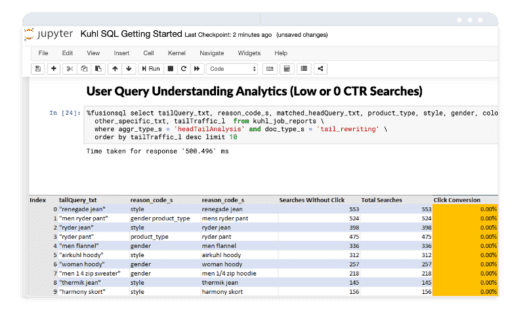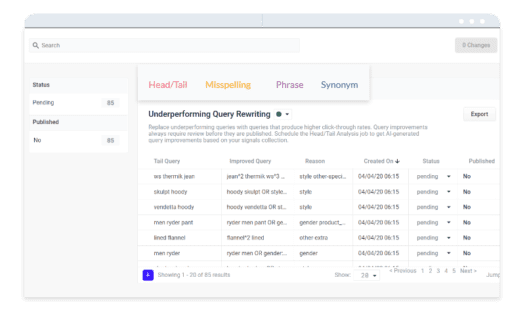
Automation and real-time modeling
Semantic vector search learns from the behavior of your customers to find products that match the semantic meaning of queries, rather than individual keyword matches. The modeling delivers more valuable results and addresses zero results with increased success. This automated learning process alleviates merchandisers from the burden of curating rules to address zero result searches. Signals boosting and Bayesian Personalized Ranking (BPR) are two methodologies informed by recent and real-time customer behavior which automatically determine how much each relevant product should be boosted.
Recommendations and classification
Automate your entire recommendation process by leveraging Lucidworks AI, including ALS and BPR algorithm-based recommenders. These algorithms can then power pipelines to be used in recommendation use cases across your website. Our platform also ships with with pre-configured methodologies for clustering and classification for ecommerce. This includes logistic regression and StarSpace models for performing query classification, which can be used to apply filters and boosts to queries on the fly without requiring query-specific rule curation.


AI for data scientists
Utilize a rich set of out-of-the-box models and features to support merchandiser requirements, freeing up your data scientists to focus on the unique aspects of your business and customers. The Data Science Toolkit Integration (DSTI) supports the research and development of custom analyses and models. The DSTI comes equipped with Seldon Core, which enables the deployment of custom models and can be used to enrich Fusion pipelines managed by search teams. Jupyter Notebooks support data analysis and experimentation in a variety of popular programming languages such as Scala and Python.
AI for merchandisers
Merchandisers set the guardrails and implement the 80/20 rule. They can define the templates and zones and let the platform’s sophisticated AI deliver the right products and content at the right time to the right customers. From individualization to trends, to catalog evolution, dynamic pages will ensure that customers receive personalized experiences. Leverage merchandiser expertise to focus on more strategic initiatives where they can boost, bury, pin, block, and add products and content that accelerate the path to purchase.


AI for search owners
Gone are the days of analyzing spreadsheets of low-performing queries. Let the machine handle curation tasks by learning from the behavior of your customers and the content of your catalog. Query Rewriting uses ML to suggest synonyms, phrases, and spelling corrections. Each suggestion includes a confidence score, making it easier for search owners to select a subset of high-confidence suggestions for approval. Head-Tail Analysis compares low-performing tail queries with performant head queries, and suggests rewrites accordingly.
Lenovo’s annual revenue contribution through search increased 175% by switching to Fusion
We don’t have to go in and validate that results are good, our customers are telling us the results are good.”
Marc Desormeau
Global Search Lead
Lenovo
Explore More Key Features
Recommendation Models
Leverage shopper signals to generate AI-powered recommendations. Learn more
Semantic Vector Search
Retrieve relevant results to challenging queries with semantic vector search. Learn more
Bring Your Own Model
Bridge the gap and invite your data science team to bring their custom developed models into production environments. Learn more
Ecommerce Customer Expectations Are Changing

Sin City Improves Search
Las Vegas travel search engine Vegas.com increased page views and engagement by 63% . Bounce rates for the mobile site dropped 8%. Conversion rates from search to a reservation or ticket increased by 33%. The team has since built the desktop search experience with Fusion as well. Full case study…

Foot Locker Gets The Perfect Fit
The American sportswear and footwear retailer put Lucidworks to work and saw a 10% lift in add-to-cart, improved personalization, and better analytics to drive merchandising decisions for promotional events.










